Pete Sutton's Blog, page 44
July 14, 2014
Book giveaway winner

Lat month I ran a giveaway for the second book in the Art of Forgetting series by Joanne Hall. contestants were asked to name the first book. Many people got the right answer - The Art of Forgetting: Rider. But there can be only one winner. Congratulations to Saffron Gardenchild from Manchester. The book will be winging its way on to you very soon!
Published on July 14, 2014 03:48
July 7, 2014
Review of Prison Noir
Prison Noir edited by Joyce Carol Oates
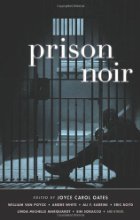
Good
Akashic books have a large catalogue of Noir books set in a variety of cities around the world. This one is a little bit different. It is stories by convicts, from within prison. There are writing programs in various prisons but as the editor says in the introduction We discovered along the way, for example, that some institutions don’t allow prisoners to write, but in others they are allowed to write but not, perversely, about crime or prisons! She also notes that it was hard to spread the call for submissions within the prison service. However the stories that they managed to collect together are, on the whole, excellent. There are of course, as in most anthologies, ones that failed to hit the spot for me, but I read them all and was never bored, a sign of a good anthology.
The anthology is split into three parts - “ghosts in the machine”, “caged birds sing” & “I saw the whole thing, it was horrible” no explanations are given as to what divides these themes but you can guess from the titles. The stories are widely diverse in tone, POV, style, language, mood and theme and yet all are recognisably similar because of the setting. Many of the stories are lyrical, soulful and introspective, as you’d expect. Prison is painted as no soft touch luxury alternative to “real” punishment (except perhaps in 3 Block from Hell by Bryan K Palmer which is about a serial killer who kills inmates). My favourites in here are: The opening story, Shuffle by Christopher M Stephenwhich is a delightfully twisted tale of prison overcrowding; Milk and Tea by Linda Michelle Marquadat (one of only two women writers in the collection) and There will be seeds for next year< by Zeke Caliguri which is about an inmate who has tried and failed to commit suicide. Suicide is a common theme, as is mental illness, respect, truth and of course guilt are also common themes.
This is a powerful collection made more so by the simple, short bios of the contributors such as - Ali F Sareini – was born in Kharbit Selim (Valley of Peace) Lebanon. He left the Lebanese civil war in 1985, was a political prisoner in Berlin, joined the US Army’s 82ndAirborne division and holds a bachelor’s degree in business administration from Campbell University and Spring Arbor University. He has just completed his twenty fifth year of incarceration for second degree murder. His story, A message in the Breath of Allah is also one that sticks in your mind, as do many of them.
In the front of the book is a map of where the prisons are that the stories are set in and the introduction notes the fact that the United States incarcerates 2.2 million individuals, a far higher rate per capita than any other nation (On the same list with the USA as number 1, the UK is 104 and China is 127)
Overall – I’m not sure the stories count as “noir” by the strictest definition, but what they are is affecting, powerfully written and arresting literature. Well worth seeking out.
Published on July 07, 2014 03:39
Today's guest post is by David Rodger
ABOUT THE AUTHOR

David J. Rodger is a British author of science fiction dark fantasy with eight novels under his belt. He is also the creator of Yellow Dawn- The Age of Hastur, an RPG that blends Cthulhu Mythos and Cyberpunk themes into a post-apocalyptic setting. His books cross many boundaries to deliver a new and exciting fusion of ideas and genres. Critics describe his work as character driven, richly plotted, delivering tension and drama with a quick narrative style, and punching far above his weight as an indie author. Each book is stand-alone and can be read in any order, but occupy a shared universe allowing you to build a deeper knowledge with every story. He has written for SFX and had short stories published in the UK, US and Canada. Represented by Floyd Hayes.
"Atmospheric and Creepy" - Alison Flood, The Guardian (UK)
Links:Official Website: http://www.davidjrodger.com/Blog: http://davidjrodger.wordpress.com/Facebook: https://www.facebook.com/david.j.rodger.1Twitter: https://twitter.com/davidjrodger David stopped by to chat about writing the Cthulhu mythos Over to David WRITING THE CTHULHU MYTHOS INTO THE FUTURESo I write science fiction dark fantasy. That's the general classification. But if you were to perch next to me at the bar and ask me what I wrote, I'd give you a little bit more flavour. The core tends to be a thriller or detective story, pushed into the near future (three novels push it even further, ten years after an apocalyptic event called Yellow Dawn), and typically resting on the sinewy, uneasy, tentacle-like pillars of H.P.Lovecraft's Cthulhu Mythos. And that's what I've become known for - writing the Cthulhu Mythos into the future.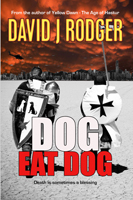
It's very rewarding to be recognised as a voice within a genre I am passionate about. It is even more exciting to see H.P.Lovecraft's work oozing further out of the shadows of obscurity and into more commercial avenues. Lovecraft, and the Cthulhu Mythos he created, is gaining the recognition it deserves.
But is that really all that is happening here?Many commentators have talked about the Cthulhu Mythos as being a lost epoch from Earth's distant past. A horror that has been and gone, leaving behind a few nasties for hapless investigators to uncover and crazed cultists to revere. H.P. Lovecraft hinted at the Mythos being from outside Time. So perhaps the current renaissance in the Cthulhu Mythos is linked to the paradoxical nature of events that can come crashing into human history from Beyond?Alan Moore would state that today's increasing interest was merely part of the foreshadowing of the approaching time when the horror of the Cthulhu Mythos rains down upon Earth and humankind. That's a frightening idea, isn't it! What is the Cthulhu Mythos? It is the catch-all net to describe a pantheon of cosmic gods and monsters. H.P.Lovecraft's body of work sits at the core of this, but there are other writers and creatives who have added to it - Robert Bloch, Brian Lumley, Clive Barker, Neil Gaiman to name a few, including myself. Many horror writers through the late 20th Century have found the Cthulhu Mythos a compelling reservoir of endless, non-traditional, creepy and disturbing nightmares. The central tenet of Lovecraft's Mythos is that human beings are incidental and irrelevant to the machinations of these Gods and Monsters. We are ants crawling across a wall. There are also the hints about the true nature of the origins of Humanity...and the reality we believe we perceive.If you’ve never delved into H.P.Lovecraft then I can’t urge you enough to try. His characters are wooden and two-dimensional, cannon-fodder for the dreadful situations they stumble into, but the brooding atmosphere his words can conjure up: it’s a wonderful discovery. And you don’t have to necessarily be a fan of horror to enjoy Lovecraft’s work. Less gore and more psychological displacement. Which is why the genre works so well when blended with other story types.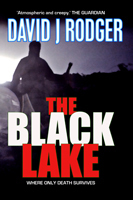 H.P.Lovecraft wrote his tales of cosmic terror in the 1920s and 1930s. Does the Cthulhu Mythos fit a futuristic setting? Absolutely. Cyberpunk, with its gritty urban settings, taught psychological tensions, fragments of hope amidst the burning wreckage of dreams and despair, makes a perfect partner for the weird, mutated horror of the Mythos. Biological experiments by rogue corporate labs go hand in hand with the monsters conjured by demented sorcerers and the fools that read recklessly from banished books. The expansion of corporate power masks the motives of men and woman and things that pretend to be human, who are seeking to acquire vast resources and wealth to unlock the boundary of the Quantisphere. Cyberpunk might sound like an anachronism from the 1980s but the nomenclature still works: technology savvy renegades fight against, or fight for, the power blocks of politics and corporate enterprise - the alliances of UTOC (United Table of Commerce). Meanwhile, the agents, detectives and investigators that represent these various powers do what they can within the maelstrom, at which point, swirling amongst all this come the tendril of the Mythos. With subtle infiltration or dramatic, city-destroying rampages, they come amongst us. When the Way is Open. When the Stars are in Alignment. And the Words are uttered, the Signs made and the Blood spilled.Cyberpunk and the Cthulhu Mythos is an exciting fusion of genres to bring to ignite within anyone's imagination. The Hollywood flavour of Cyberpunk would be movies like Bladerunner, Minority Report, and Dredd. Infuse this with the outré horror of the Cthulhu Mythos and you can start to visualise a genuinely powerful story experience. If the budget is right. Adaptations of Lovecraft films have historically been victims of poor budgets, relegated to shock & gore movies which can still be enjoyed but they tend to miss the vital point about Lovecraft’s work. Quick digression: having said that, if you’ve not seen them, “Re-Animator” and “From Beyond” are worthy. As is John Carpenter’s The Thing, which not classic Cthulhu Mythos does convey a sense of the alien horror that can come with it. Also grab a view of Cthulhu (2007) directed by Daniel Gildark, which I think does an outstanding job of bringing a contemporary feel to the uneasy, subtle yet claustrophobic terror of when the Mythos is close at hand in a small town. Guillermo Del Toro (Hellboy) could be the saviour knight in shining chrome and cyberware. He’s been fighting to get one of Lovecraft’s best stories made into a feature-length, seriously funded movie. At The Mountains of Madness. Which follows the Lake and Peabody Expedition into the hidden depths of Antarctica in the 1930s where they unearth an alien horror frozen in the ice at the foot of an as-yet unexplored mountain range. Interestingly, recent satellite surveys of Antarctica have revealed an undiscovered mountain range buried beneath the miles-thick ice: so maybe Lovecraft knew something we didn’t. Not sure what angle Del Toro would take but I’d like to think he would punch into this with a fusion of big-technology and nefarious corporate interests (Pacific Rim meets ALIEN).
H.P.Lovecraft wrote his tales of cosmic terror in the 1920s and 1930s. Does the Cthulhu Mythos fit a futuristic setting? Absolutely. Cyberpunk, with its gritty urban settings, taught psychological tensions, fragments of hope amidst the burning wreckage of dreams and despair, makes a perfect partner for the weird, mutated horror of the Mythos. Biological experiments by rogue corporate labs go hand in hand with the monsters conjured by demented sorcerers and the fools that read recklessly from banished books. The expansion of corporate power masks the motives of men and woman and things that pretend to be human, who are seeking to acquire vast resources and wealth to unlock the boundary of the Quantisphere. Cyberpunk might sound like an anachronism from the 1980s but the nomenclature still works: technology savvy renegades fight against, or fight for, the power blocks of politics and corporate enterprise - the alliances of UTOC (United Table of Commerce). Meanwhile, the agents, detectives and investigators that represent these various powers do what they can within the maelstrom, at which point, swirling amongst all this come the tendril of the Mythos. With subtle infiltration or dramatic, city-destroying rampages, they come amongst us. When the Way is Open. When the Stars are in Alignment. And the Words are uttered, the Signs made and the Blood spilled.Cyberpunk and the Cthulhu Mythos is an exciting fusion of genres to bring to ignite within anyone's imagination. The Hollywood flavour of Cyberpunk would be movies like Bladerunner, Minority Report, and Dredd. Infuse this with the outré horror of the Cthulhu Mythos and you can start to visualise a genuinely powerful story experience. If the budget is right. Adaptations of Lovecraft films have historically been victims of poor budgets, relegated to shock & gore movies which can still be enjoyed but they tend to miss the vital point about Lovecraft’s work. Quick digression: having said that, if you’ve not seen them, “Re-Animator” and “From Beyond” are worthy. As is John Carpenter’s The Thing, which not classic Cthulhu Mythos does convey a sense of the alien horror that can come with it. Also grab a view of Cthulhu (2007) directed by Daniel Gildark, which I think does an outstanding job of bringing a contemporary feel to the uneasy, subtle yet claustrophobic terror of when the Mythos is close at hand in a small town. Guillermo Del Toro (Hellboy) could be the saviour knight in shining chrome and cyberware. He’s been fighting to get one of Lovecraft’s best stories made into a feature-length, seriously funded movie. At The Mountains of Madness. Which follows the Lake and Peabody Expedition into the hidden depths of Antarctica in the 1930s where they unearth an alien horror frozen in the ice at the foot of an as-yet unexplored mountain range. Interestingly, recent satellite surveys of Antarctica have revealed an undiscovered mountain range buried beneath the miles-thick ice: so maybe Lovecraft knew something we didn’t. Not sure what angle Del Toro would take but I’d like to think he would punch into this with a fusion of big-technology and nefarious corporate interests (Pacific Rim meets ALIEN). 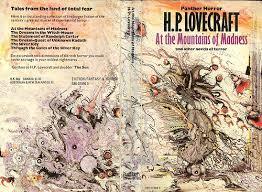 Del Toro has stuck to his guns with ATMoM, even after Universal essentially killed the project. But Del Toro’s new home, Legendary Pictures, holds a beam of new hope. Coupled with Del Toro recently conceding to make a PG-13 rather than a more financially risky R-rating. So Lovecraft could, at last, arrive on the big screen with more gusto than Cloverfield or The Mist. And it could come blended with the machines, tech and attitude of Cyberpunk. What is really driving H.P.Lovecraft into the minds of more people? Big hitters like Del Toro. But also the convergence of technology and popular culture: Indie-movies, computer games, art and the Internet. Personally, I like to think people are finally growing bored with the standard Hollywood definition of horror: ghosts, demons, vampires, werewolves, Frankenstein's monster. The media is picking up on this. There was a BBC Radio 4 documentary about the work of H.P.Lovecraft last year. And now Hidetaka Miyazaki, creator of Dark Souls has turned to Cthulhu mythology with Bloodborne- a game for Sony Playstation. Sadly, there is a dangerous twist to this increased awareness of the Mythos. The madness that it brings. Slenderman is a prime example of a Mythos meme. Something created based on dream-like visions and distilled nightmare. Now people are recreating it, which in turn exposes more minds to it, and so it spreads, like some sanity-shredding aspect of The Yellow Sign (Hastur) or a runic invocation of the Lloigor. Two separate stabbing incidents earlier this year, Wisconsin and Ohio, have been attributed to exposure to the Slenderman meme.
Del Toro has stuck to his guns with ATMoM, even after Universal essentially killed the project. But Del Toro’s new home, Legendary Pictures, holds a beam of new hope. Coupled with Del Toro recently conceding to make a PG-13 rather than a more financially risky R-rating. So Lovecraft could, at last, arrive on the big screen with more gusto than Cloverfield or The Mist. And it could come blended with the machines, tech and attitude of Cyberpunk. What is really driving H.P.Lovecraft into the minds of more people? Big hitters like Del Toro. But also the convergence of technology and popular culture: Indie-movies, computer games, art and the Internet. Personally, I like to think people are finally growing bored with the standard Hollywood definition of horror: ghosts, demons, vampires, werewolves, Frankenstein's monster. The media is picking up on this. There was a BBC Radio 4 documentary about the work of H.P.Lovecraft last year. And now Hidetaka Miyazaki, creator of Dark Souls has turned to Cthulhu mythology with Bloodborne- a game for Sony Playstation. Sadly, there is a dangerous twist to this increased awareness of the Mythos. The madness that it brings. Slenderman is a prime example of a Mythos meme. Something created based on dream-like visions and distilled nightmare. Now people are recreating it, which in turn exposes more minds to it, and so it spreads, like some sanity-shredding aspect of The Yellow Sign (Hastur) or a runic invocation of the Lloigor. Two separate stabbing incidents earlier this year, Wisconsin and Ohio, have been attributed to exposure to the Slenderman meme.
I have been told I am in a prime position to capitalise on this resurging interest in Lovecraft and the Mythos. Six of my eight novels are wrapped around the Cthulhu Mythos. In 2008 I published Yellow Dawn - The Age of Hastur, an RPG that takes the near-future universe of my books and shakes it up through a dramatic apocalyptic event - the consequence of a (partially failed) plot to inject the King in Yellow into Earth's consciousness. The RPG provided an extended platform, a new setting for new novels taking place after this Mythos-pocalypse (Dog Eat Dog; The Black Lake; The Social Club). So what happens next?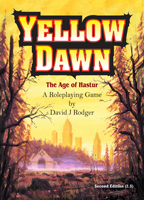 Go back to 1994 and the John Carpenter movie "In The Mouth of Madness" and you get a vivid account of where this meme could go in the full furor of the Cthulhu Mythos. The fictional author Sutter Cane corrupting the local reality with his written words – bringing the Hell of the Outer Chaos tumbling through the Void of time and Space. Science fiction is gaining an ever-increasing hold of the mainstream (maybe because hipsters try to play cool by being geeks?). Cyberpunk is emerging as the world of Tomorrow through technology, terrorism and politics. The Mythos itself is like a virus. It has the power to evolve. Read the signs: New horror ahead.
Go back to 1994 and the John Carpenter movie "In The Mouth of Madness" and you get a vivid account of where this meme could go in the full furor of the Cthulhu Mythos. The fictional author Sutter Cane corrupting the local reality with his written words – bringing the Hell of the Outer Chaos tumbling through the Void of time and Space. Science fiction is gaining an ever-increasing hold of the mainstream (maybe because hipsters try to play cool by being geeks?). Cyberpunk is emerging as the world of Tomorrow through technology, terrorism and politics. The Mythos itself is like a virus. It has the power to evolve. Read the signs: New horror ahead.

David J. Rodger is a British author of science fiction dark fantasy with eight novels under his belt. He is also the creator of Yellow Dawn- The Age of Hastur, an RPG that blends Cthulhu Mythos and Cyberpunk themes into a post-apocalyptic setting. His books cross many boundaries to deliver a new and exciting fusion of ideas and genres. Critics describe his work as character driven, richly plotted, delivering tension and drama with a quick narrative style, and punching far above his weight as an indie author. Each book is stand-alone and can be read in any order, but occupy a shared universe allowing you to build a deeper knowledge with every story. He has written for SFX and had short stories published in the UK, US and Canada. Represented by Floyd Hayes.
"Atmospheric and Creepy" - Alison Flood, The Guardian (UK)
Links:Official Website: http://www.davidjrodger.com/Blog: http://davidjrodger.wordpress.com/Facebook: https://www.facebook.com/david.j.rodger.1Twitter: https://twitter.com/davidjrodger David stopped by to chat about writing the Cthulhu mythos Over to David WRITING THE CTHULHU MYTHOS INTO THE FUTURESo I write science fiction dark fantasy. That's the general classification. But if you were to perch next to me at the bar and ask me what I wrote, I'd give you a little bit more flavour. The core tends to be a thriller or detective story, pushed into the near future (three novels push it even further, ten years after an apocalyptic event called Yellow Dawn), and typically resting on the sinewy, uneasy, tentacle-like pillars of H.P.Lovecraft's Cthulhu Mythos. And that's what I've become known for - writing the Cthulhu Mythos into the future.

It's very rewarding to be recognised as a voice within a genre I am passionate about. It is even more exciting to see H.P.Lovecraft's work oozing further out of the shadows of obscurity and into more commercial avenues. Lovecraft, and the Cthulhu Mythos he created, is gaining the recognition it deserves.
But is that really all that is happening here?Many commentators have talked about the Cthulhu Mythos as being a lost epoch from Earth's distant past. A horror that has been and gone, leaving behind a few nasties for hapless investigators to uncover and crazed cultists to revere. H.P. Lovecraft hinted at the Mythos being from outside Time. So perhaps the current renaissance in the Cthulhu Mythos is linked to the paradoxical nature of events that can come crashing into human history from Beyond?Alan Moore would state that today's increasing interest was merely part of the foreshadowing of the approaching time when the horror of the Cthulhu Mythos rains down upon Earth and humankind. That's a frightening idea, isn't it! What is the Cthulhu Mythos? It is the catch-all net to describe a pantheon of cosmic gods and monsters. H.P.Lovecraft's body of work sits at the core of this, but there are other writers and creatives who have added to it - Robert Bloch, Brian Lumley, Clive Barker, Neil Gaiman to name a few, including myself. Many horror writers through the late 20th Century have found the Cthulhu Mythos a compelling reservoir of endless, non-traditional, creepy and disturbing nightmares. The central tenet of Lovecraft's Mythos is that human beings are incidental and irrelevant to the machinations of these Gods and Monsters. We are ants crawling across a wall. There are also the hints about the true nature of the origins of Humanity...and the reality we believe we perceive.If you’ve never delved into H.P.Lovecraft then I can’t urge you enough to try. His characters are wooden and two-dimensional, cannon-fodder for the dreadful situations they stumble into, but the brooding atmosphere his words can conjure up: it’s a wonderful discovery. And you don’t have to necessarily be a fan of horror to enjoy Lovecraft’s work. Less gore and more psychological displacement. Which is why the genre works so well when blended with other story types.
 H.P.Lovecraft wrote his tales of cosmic terror in the 1920s and 1930s. Does the Cthulhu Mythos fit a futuristic setting? Absolutely. Cyberpunk, with its gritty urban settings, taught psychological tensions, fragments of hope amidst the burning wreckage of dreams and despair, makes a perfect partner for the weird, mutated horror of the Mythos. Biological experiments by rogue corporate labs go hand in hand with the monsters conjured by demented sorcerers and the fools that read recklessly from banished books. The expansion of corporate power masks the motives of men and woman and things that pretend to be human, who are seeking to acquire vast resources and wealth to unlock the boundary of the Quantisphere. Cyberpunk might sound like an anachronism from the 1980s but the nomenclature still works: technology savvy renegades fight against, or fight for, the power blocks of politics and corporate enterprise - the alliances of UTOC (United Table of Commerce). Meanwhile, the agents, detectives and investigators that represent these various powers do what they can within the maelstrom, at which point, swirling amongst all this come the tendril of the Mythos. With subtle infiltration or dramatic, city-destroying rampages, they come amongst us. When the Way is Open. When the Stars are in Alignment. And the Words are uttered, the Signs made and the Blood spilled.Cyberpunk and the Cthulhu Mythos is an exciting fusion of genres to bring to ignite within anyone's imagination. The Hollywood flavour of Cyberpunk would be movies like Bladerunner, Minority Report, and Dredd. Infuse this with the outré horror of the Cthulhu Mythos and you can start to visualise a genuinely powerful story experience. If the budget is right. Adaptations of Lovecraft films have historically been victims of poor budgets, relegated to shock & gore movies which can still be enjoyed but they tend to miss the vital point about Lovecraft’s work. Quick digression: having said that, if you’ve not seen them, “Re-Animator” and “From Beyond” are worthy. As is John Carpenter’s The Thing, which not classic Cthulhu Mythos does convey a sense of the alien horror that can come with it. Also grab a view of Cthulhu (2007) directed by Daniel Gildark, which I think does an outstanding job of bringing a contemporary feel to the uneasy, subtle yet claustrophobic terror of when the Mythos is close at hand in a small town. Guillermo Del Toro (Hellboy) could be the saviour knight in shining chrome and cyberware. He’s been fighting to get one of Lovecraft’s best stories made into a feature-length, seriously funded movie. At The Mountains of Madness. Which follows the Lake and Peabody Expedition into the hidden depths of Antarctica in the 1930s where they unearth an alien horror frozen in the ice at the foot of an as-yet unexplored mountain range. Interestingly, recent satellite surveys of Antarctica have revealed an undiscovered mountain range buried beneath the miles-thick ice: so maybe Lovecraft knew something we didn’t. Not sure what angle Del Toro would take but I’d like to think he would punch into this with a fusion of big-technology and nefarious corporate interests (Pacific Rim meets ALIEN).
H.P.Lovecraft wrote his tales of cosmic terror in the 1920s and 1930s. Does the Cthulhu Mythos fit a futuristic setting? Absolutely. Cyberpunk, with its gritty urban settings, taught psychological tensions, fragments of hope amidst the burning wreckage of dreams and despair, makes a perfect partner for the weird, mutated horror of the Mythos. Biological experiments by rogue corporate labs go hand in hand with the monsters conjured by demented sorcerers and the fools that read recklessly from banished books. The expansion of corporate power masks the motives of men and woman and things that pretend to be human, who are seeking to acquire vast resources and wealth to unlock the boundary of the Quantisphere. Cyberpunk might sound like an anachronism from the 1980s but the nomenclature still works: technology savvy renegades fight against, or fight for, the power blocks of politics and corporate enterprise - the alliances of UTOC (United Table of Commerce). Meanwhile, the agents, detectives and investigators that represent these various powers do what they can within the maelstrom, at which point, swirling amongst all this come the tendril of the Mythos. With subtle infiltration or dramatic, city-destroying rampages, they come amongst us. When the Way is Open. When the Stars are in Alignment. And the Words are uttered, the Signs made and the Blood spilled.Cyberpunk and the Cthulhu Mythos is an exciting fusion of genres to bring to ignite within anyone's imagination. The Hollywood flavour of Cyberpunk would be movies like Bladerunner, Minority Report, and Dredd. Infuse this with the outré horror of the Cthulhu Mythos and you can start to visualise a genuinely powerful story experience. If the budget is right. Adaptations of Lovecraft films have historically been victims of poor budgets, relegated to shock & gore movies which can still be enjoyed but they tend to miss the vital point about Lovecraft’s work. Quick digression: having said that, if you’ve not seen them, “Re-Animator” and “From Beyond” are worthy. As is John Carpenter’s The Thing, which not classic Cthulhu Mythos does convey a sense of the alien horror that can come with it. Also grab a view of Cthulhu (2007) directed by Daniel Gildark, which I think does an outstanding job of bringing a contemporary feel to the uneasy, subtle yet claustrophobic terror of when the Mythos is close at hand in a small town. Guillermo Del Toro (Hellboy) could be the saviour knight in shining chrome and cyberware. He’s been fighting to get one of Lovecraft’s best stories made into a feature-length, seriously funded movie. At The Mountains of Madness. Which follows the Lake and Peabody Expedition into the hidden depths of Antarctica in the 1930s where they unearth an alien horror frozen in the ice at the foot of an as-yet unexplored mountain range. Interestingly, recent satellite surveys of Antarctica have revealed an undiscovered mountain range buried beneath the miles-thick ice: so maybe Lovecraft knew something we didn’t. Not sure what angle Del Toro would take but I’d like to think he would punch into this with a fusion of big-technology and nefarious corporate interests (Pacific Rim meets ALIEN).  Del Toro has stuck to his guns with ATMoM, even after Universal essentially killed the project. But Del Toro’s new home, Legendary Pictures, holds a beam of new hope. Coupled with Del Toro recently conceding to make a PG-13 rather than a more financially risky R-rating. So Lovecraft could, at last, arrive on the big screen with more gusto than Cloverfield or The Mist. And it could come blended with the machines, tech and attitude of Cyberpunk. What is really driving H.P.Lovecraft into the minds of more people? Big hitters like Del Toro. But also the convergence of technology and popular culture: Indie-movies, computer games, art and the Internet. Personally, I like to think people are finally growing bored with the standard Hollywood definition of horror: ghosts, demons, vampires, werewolves, Frankenstein's monster. The media is picking up on this. There was a BBC Radio 4 documentary about the work of H.P.Lovecraft last year. And now Hidetaka Miyazaki, creator of Dark Souls has turned to Cthulhu mythology with Bloodborne- a game for Sony Playstation. Sadly, there is a dangerous twist to this increased awareness of the Mythos. The madness that it brings. Slenderman is a prime example of a Mythos meme. Something created based on dream-like visions and distilled nightmare. Now people are recreating it, which in turn exposes more minds to it, and so it spreads, like some sanity-shredding aspect of The Yellow Sign (Hastur) or a runic invocation of the Lloigor. Two separate stabbing incidents earlier this year, Wisconsin and Ohio, have been attributed to exposure to the Slenderman meme.
Del Toro has stuck to his guns with ATMoM, even after Universal essentially killed the project. But Del Toro’s new home, Legendary Pictures, holds a beam of new hope. Coupled with Del Toro recently conceding to make a PG-13 rather than a more financially risky R-rating. So Lovecraft could, at last, arrive on the big screen with more gusto than Cloverfield or The Mist. And it could come blended with the machines, tech and attitude of Cyberpunk. What is really driving H.P.Lovecraft into the minds of more people? Big hitters like Del Toro. But also the convergence of technology and popular culture: Indie-movies, computer games, art and the Internet. Personally, I like to think people are finally growing bored with the standard Hollywood definition of horror: ghosts, demons, vampires, werewolves, Frankenstein's monster. The media is picking up on this. There was a BBC Radio 4 documentary about the work of H.P.Lovecraft last year. And now Hidetaka Miyazaki, creator of Dark Souls has turned to Cthulhu mythology with Bloodborne- a game for Sony Playstation. Sadly, there is a dangerous twist to this increased awareness of the Mythos. The madness that it brings. Slenderman is a prime example of a Mythos meme. Something created based on dream-like visions and distilled nightmare. Now people are recreating it, which in turn exposes more minds to it, and so it spreads, like some sanity-shredding aspect of The Yellow Sign (Hastur) or a runic invocation of the Lloigor. Two separate stabbing incidents earlier this year, Wisconsin and Ohio, have been attributed to exposure to the Slenderman meme.I have been told I am in a prime position to capitalise on this resurging interest in Lovecraft and the Mythos. Six of my eight novels are wrapped around the Cthulhu Mythos. In 2008 I published Yellow Dawn - The Age of Hastur, an RPG that takes the near-future universe of my books and shakes it up through a dramatic apocalyptic event - the consequence of a (partially failed) plot to inject the King in Yellow into Earth's consciousness. The RPG provided an extended platform, a new setting for new novels taking place after this Mythos-pocalypse (Dog Eat Dog; The Black Lake; The Social Club). So what happens next?
 Go back to 1994 and the John Carpenter movie "In The Mouth of Madness" and you get a vivid account of where this meme could go in the full furor of the Cthulhu Mythos. The fictional author Sutter Cane corrupting the local reality with his written words – bringing the Hell of the Outer Chaos tumbling through the Void of time and Space. Science fiction is gaining an ever-increasing hold of the mainstream (maybe because hipsters try to play cool by being geeks?). Cyberpunk is emerging as the world of Tomorrow through technology, terrorism and politics. The Mythos itself is like a virus. It has the power to evolve. Read the signs: New horror ahead.
Go back to 1994 and the John Carpenter movie "In The Mouth of Madness" and you get a vivid account of where this meme could go in the full furor of the Cthulhu Mythos. The fictional author Sutter Cane corrupting the local reality with his written words – bringing the Hell of the Outer Chaos tumbling through the Void of time and Space. Science fiction is gaining an ever-increasing hold of the mainstream (maybe because hipsters try to play cool by being geeks?). Cyberpunk is emerging as the world of Tomorrow through technology, terrorism and politics. The Mythos itself is like a virus. It has the power to evolve. Read the signs: New horror ahead.
Published on July 07, 2014 00:46
July 4, 2014
Today's guest post is by Emma Russell
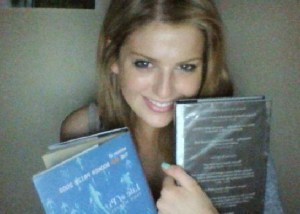
Emma dropped in to tell me what she learned about writing by writing her novel
Emma Russell is a twenty three year old freelance writer, blogger and book enthusiast. She graduated in 2011 with a degree in English Literature from the University of Ireland, Maynooth and after a year teaching English in Greece has since returned to complete an MA in Publishing at Oxford Brookes University. She is a member of London Writer’s Circle and Freehand Writers, Oxford. Emma’s first novella ‘The Stolen Rose’, will be released as a free ebook in August. You can read a preview on her website http://emmarussellwriting.com/and can follow her on Facebook https://www.facebook.com/emmarussellauthorand Twitter https://twitter.com/TheStolenRose
Over to Emma:
What I learned about writing when I wrote The Stolen Rose: Lessons from a tumultuous journey
#1. Caffeine is gold dust.
First on the list, and rightly so. I have yet to meet a writer not completely dependent on the life-giving, idea-inspiring substance.
#2. Write for others.
It’s too easy to get lost in the art of your form, but the audience aren’t mind-readers so keep it simple. Don’t try to be the next James Joyce, just be yourself.
#3. Write about what inspires you.
Nothing shines through great fiction more than an author’s love of their work. Writing’s not easy, so what’s the point if you’re not passionate about what you do?
#4. Call yourself a writer.
Establish an online presence with a website, build up a network of followers on Facebookand Twitter, offer interesting content and stay connected. Nobody can sell you or your work better than you can.
#5. Prepare to be the best and worst version of yourself.
Expect three-day old clothes, unbrushed hair and a diet of chocolate chip muffins. You may terrify children in the street but that elusive ‘writer’s glow’ will shine through the grime and stress. Personally, if it means I can follow my dream and write, I’d settle for a grimey, but happy, version of myself any day.
Published on July 04, 2014 10:00
Friday Flash
Overdue book
I checked the Necronomicon out of the library and now I can’t find it, and it’s overdue.
I’ve probably mislaid it in my non-Euclidean bedroom.
Perhaps it has been eaten by some rugose, squamous, tentacular horror?
Perhaps someone else picked it up? Elsie from my mum’s book club did go mad last week after all, although she wasn’t all there to begin with so shouldn’t have been reading forbidden lore.
I’ll have to go in and explain. I’m worried about the fine. Those librarians are really scary and there is that unspeakably shaped funny coloured stain on the library ceiling.
I checked the Necronomicon out of the library and now I can’t find it, and it’s overdue.
I’ve probably mislaid it in my non-Euclidean bedroom.
Perhaps it has been eaten by some rugose, squamous, tentacular horror?
Perhaps someone else picked it up? Elsie from my mum’s book club did go mad last week after all, although she wasn’t all there to begin with so shouldn’t have been reading forbidden lore.
I’ll have to go in and explain. I’m worried about the fine. Those librarians are really scary and there is that unspeakably shaped funny coloured stain on the library ceiling.
Published on July 04, 2014 02:17
July 1, 2014
Review of Your deceptive mind by Steven Novella
Your deceptive mind: A Scientific Guide to Critical Thinking Skills by Professor Steven Novella

This is part of the Great courses series and includes 24 lectures that I listened to, so not strictly a book!
Novella’s assertion is that at no time in human history have we had access to so much information and so much misinformation. He covers the neuroscience of thinking, the need for critical thinking, a quick course on logical fallacies, biases, critical thinking, science and pseudoscience, conspiracy thinking and so much more. This is a marathon at Twelve and a half hours but very much worth it. Even as someone who is interested in the scientific method, critical thinking, scepticism and logical fallacies I learned some new things. I would say that every single student in our schools should be taught this course as well as media studies (for the understanding of propaganda and political bias). If they were I bet the world would be a better place. I have only scored it as “Good” as it repeated a lot of information I already know but I would recommend this course to everyone.
Overall – Great course of lectures that present critical thinking in easily digestible chunks
More information here: http://www.thegreatcourses.co.uk/tgc/Courses/course_detail.aspx?cid=9344

This is part of the Great courses series and includes 24 lectures that I listened to, so not strictly a book!
Novella’s assertion is that at no time in human history have we had access to so much information and so much misinformation. He covers the neuroscience of thinking, the need for critical thinking, a quick course on logical fallacies, biases, critical thinking, science and pseudoscience, conspiracy thinking and so much more. This is a marathon at Twelve and a half hours but very much worth it. Even as someone who is interested in the scientific method, critical thinking, scepticism and logical fallacies I learned some new things. I would say that every single student in our schools should be taught this course as well as media studies (for the understanding of propaganda and political bias). If they were I bet the world would be a better place. I have only scored it as “Good” as it repeated a lot of information I already know but I would recommend this course to everyone.
Overall – Great course of lectures that present critical thinking in easily digestible chunks
More information here: http://www.thegreatcourses.co.uk/tgc/Courses/course_detail.aspx?cid=9344
Published on July 01, 2014 03:17
June 30, 2014
That's five things
Been tagged by Sarah Ellender to write 5 things about my Work in Progress.
1 - The working title is "Seven Deadly Swords"
2 - 7 word pitch is "Cursed crusader spends several lifetimes seeking redemption"
3 - So what's it really about? During the first Crusade in the 11th century a set of knights form together in a new order dedicated to the Seven Heavenly Virtues. They become cursed by the Seven Deadly Sins and the story is of one of them Patience/Wrath attempting to break the curse across the ages.
4 - I started writing this as a comic script in 2013. When it was passed over by a couple of comics folk I wondered if it would work as a novel. I'm now around about 45,000 words through the first draft and that's roughly half way I reckon.
5 - I wrote the first 20k pretty fast, easy as most of it was in script form anyway, however the rest has crawled along adding a few thousand words here and there. This is why I've signed up for Clarion Write-a-thon in order to try and crank out 40k in 6 weeks. So far I'm on track. If you fancy sponsoring this mad dash for the finish line you can do here
1 - The working title is "Seven Deadly Swords"
2 - 7 word pitch is "Cursed crusader spends several lifetimes seeking redemption"
3 - So what's it really about? During the first Crusade in the 11th century a set of knights form together in a new order dedicated to the Seven Heavenly Virtues. They become cursed by the Seven Deadly Sins and the story is of one of them Patience/Wrath attempting to break the curse across the ages.
4 - I started writing this as a comic script in 2013. When it was passed over by a couple of comics folk I wondered if it would work as a novel. I'm now around about 45,000 words through the first draft and that's roughly half way I reckon.
5 - I wrote the first 20k pretty fast, easy as most of it was in script form anyway, however the rest has crawled along adding a few thousand words here and there. This is why I've signed up for Clarion Write-a-thon in order to try and crank out 40k in 6 weeks. So far I'm on track. If you fancy sponsoring this mad dash for the finish line you can do here
Published on June 30, 2014 06:38
June 27, 2014
Tigerman review
Tigerman by Nick Hakaway
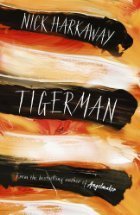
How does an author follow up an award winning book? By writing something completely different but equally compelling. This is the trick that Nick Harkaway has pulled off with this, his third book.
Lester Ferris is a sergeant in the infantry who winds up on the island of Mancreu after a tour in Afghanistan. This is a former British colony in the Arabian sea that has been given over to the NATO and Allied Protection Force of Mancreu (NatProMan). Technically Lester is the senior officer of the United Kingdom’s Mancreu command and senior consular member. But the whole island is imminently going to be demolished due to an extinction level threat from outgassing of toxicity and mutant bacteria from volcanic vents. Previous outgassings have had some unusual properties and are totally unpredictable.
Lester has established several fair weather friendships but none so important to him than with ‘the boy’, a comics book obsessed, internet savvy local youth who calls himself ‘Robin’. He is also friends with the NatProMan man in charge, the Japanese scientist studying the island and a local café owner. The island has become a bit of a backwater, due to people Leaving (yes with a capital L) and the UK government basically abandoning it. This has led to a fleet of illicit ships floating just off the island, listening stations, black-ops and all sorts of other shady dealings that governments can treat with plausible deniability.
Lester’s job is basically to keep the consulate ticking over and “not get involved” apart from to do some basic policing and representing Britain in a nominal way. When violence starts to spread and Lester gets more involved with the boy it becomes ever more difficult for him to remain aloof and he feels the need to become involved, which the boy encourages. It isn’t long before the legend of the Tigerman is born.
Tigerman, although ostensibly built like a superhero origin tale and drawing on comic book colour (“full of win”, “We are made of awesome”) is an endearing paternal tale and a complex character study. In fact Tigerman only just dips its toe into genre and if you’re looking for full on SF&F then this may not be the place to look. However it is a great read and Mancreu and its colourful cast of characters is a great place to visit for the duration of this book. It has things to say about politics and the state of the world making It a more reflective book than the previous two, but all the more powerful for it. It is also a book, like Gone Away World where, when you get to the end, you are tempted to start all over again. That, I feel, is the sign of a great book.
Overall - Harkaway just seems to be getting better, if you like his other books go and get a copy
Published on June 27, 2014 05:18
June 26, 2014
Clarion Write-a-thon. What? Why?
Last week I signed up for Clarion West Write-a-thon and committed to write 1,200 words a day for around six weeks (which I’ve so far managed). The Write-a-Thon officially runs at the same time as the Clarion Science Fiction & Fantasy Writers' Workshop at UC San Diego. From June 22 to August 2, 2014, Write-a-Thon writers and sponsors can tap into the creative energy of the renowned six-week Clarion workshop, encourage this year's Clarion students, and help secure the financial future of Clarion, all without leaving home.

Why did I do it – I hear you ask?
Well it’s a write-a-thon, and I’m a writer so it seems like it’s something I can do. It’s also a fantastic course (that one day, I dream I may eventually be able to attend, just need to find my fortune first!) and a great bunch of folks. I did it last year and it kick started my first attempt at a novel. Now I’m hoping it will help me crank out the first draft of my novel in progress. If I manage to hit the 1,200 words a day I’ll end the write-a-thon with a book length draft (adding the almost 50 odd thousand words to the 30 odd thousand words I already have)
So it’s a good way to give myself a kick and raise some money for a good cause. So if you enjoy this blog, and my short stories and would like to see my debut novel at some point in the future then please do sponsor me. As Mr Tesco is fond of telling us – ‘every little helps’.
If you sponsor me $10 I will write you a flash fiction story of between 100 - 500 words
For $20 I'll do one of 500 - 1000 words
For $40+ I'll write you a short story of around 3,000 words
Mail BRSBKBLOG at GMAIL in order to get your stories (which will be written after the write-a-thon has finished.
All donations are made through The Clarion Foundation, a 501(c)(3) non-profit organization, EIN #20-3114945.
FAQs here: http://clarionwriteathon.org/qa/
Published on June 26, 2014 05:12
June 25, 2014
NFFD - what I did at the weekend
Saturday was National Flash Fiction Day (NFFD) and in celebration Bristol Flashput on two rather splendid events.

The first was a Flash Fiction workshop given by Calum Kerr and Pauline Masurel where we learned what flash was and a undertook a number of interesting writing exercises. With a bit of work one of mine will see the light of day at some point.
After the workshop several of us took a long slow wander in the blazing sunshine to the Lansdown pub. Not just so we could enjoy a pint but also to share our flash fiction with a packed room. There were 12 fantastic readers and also yours truly.
In order of appearance: Calum reading from Eat My Words,

Judy Darley,
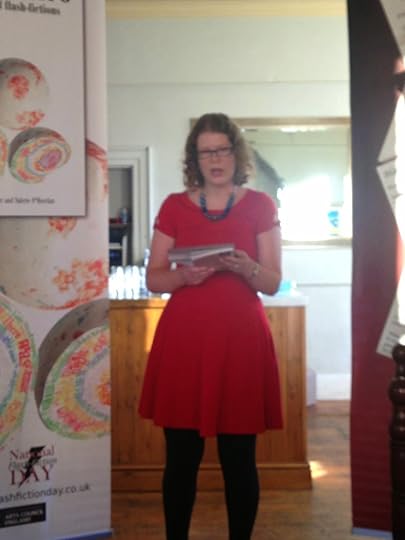
then me – I read White noise/Black silence and Not Alone (as yet unpublished),

after me were Mazzy,

Diane Simmons,

Deborah Rickard,

Tim Stevenson,

Marc Nash,

Carrie Etter,
Lucy English,

Richard Holt,

Tania Hershman,
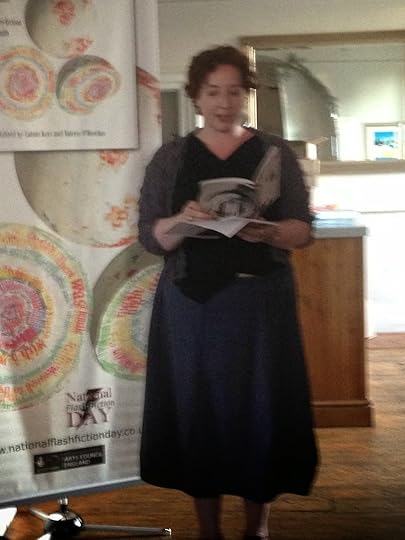
Calum — reading his own stories this time. The final reader was
Kevlin Henney, the organiser of this literary buffet.

It was an eclectic and entertaining bunch of stories and a great night. Would love to do it again next year.
The day also saw the release of the NFFD anthology, Eat My Words

The first was a Flash Fiction workshop given by Calum Kerr and Pauline Masurel where we learned what flash was and a undertook a number of interesting writing exercises. With a bit of work one of mine will see the light of day at some point.
After the workshop several of us took a long slow wander in the blazing sunshine to the Lansdown pub. Not just so we could enjoy a pint but also to share our flash fiction with a packed room. There were 12 fantastic readers and also yours truly.
In order of appearance: Calum reading from Eat My Words,

Judy Darley,

then me – I read White noise/Black silence and Not Alone (as yet unpublished),

after me were Mazzy,

Diane Simmons,

Deborah Rickard,

Tim Stevenson,

Marc Nash,

Carrie Etter,
Lucy English,

Richard Holt,

Tania Hershman,

Calum — reading his own stories this time. The final reader was
Kevlin Henney, the organiser of this literary buffet.

It was an eclectic and entertaining bunch of stories and a great night. Would love to do it again next year.
The day also saw the release of the NFFD anthology, Eat My Words
Published on June 25, 2014 06:52
Pete Sutton's Blog
- Pete Sutton's profile
- 14 followers
Pete Sutton isn't a Goodreads Author
(yet),
but they
do have a blog,
so here are some recent posts imported from
their feed.



